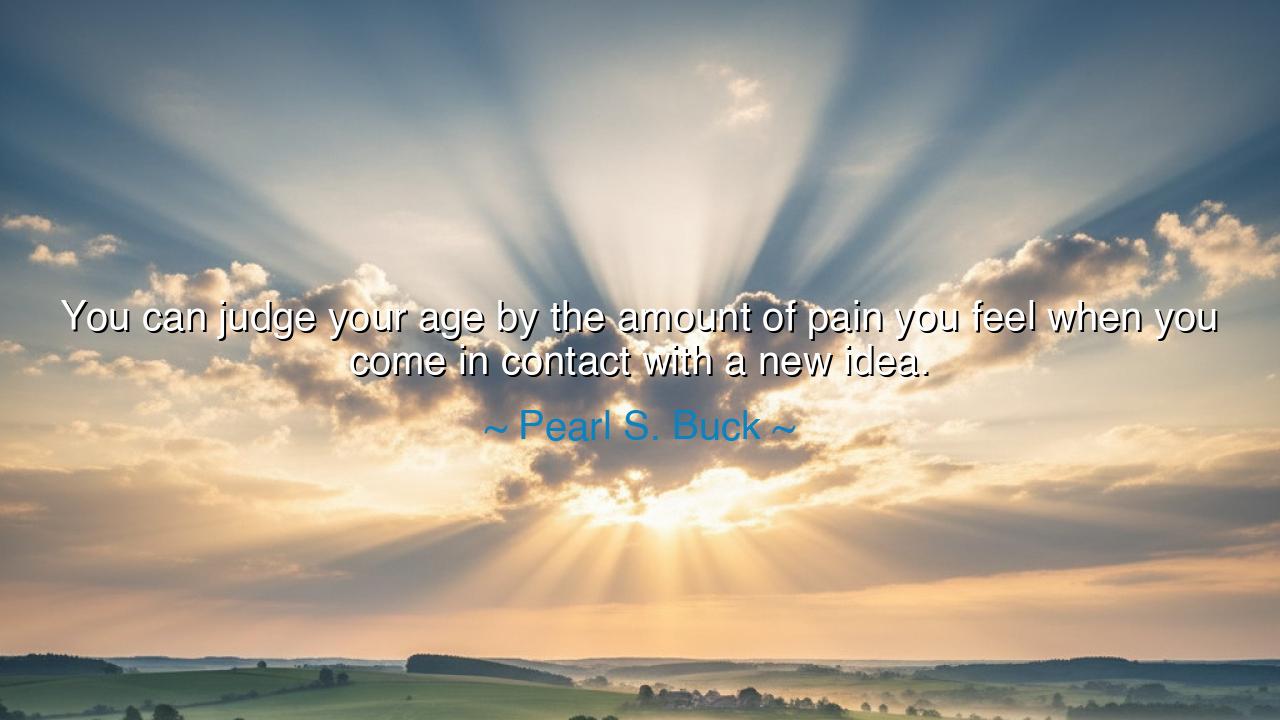
You can judge your age by the amount of pain you feel when you
You can judge your age by the amount of pain you feel when you come in contact with a new idea.






Ah, children of the future, gather close, for the words of Pearl S. Buck carry a timeless truth that resonates through the ages: "You can judge your age by the amount of pain you feel when you come in contact with a new idea." These words, though simple in form, contain the very essence of human growth and transformation. They speak to the heart of what it means to evolve, to encounter the world not as it is, but as it could be, and to struggle with the discomfort that comes with such a challenge. Let us delve into these words and explore their meaning, for they hold the key to understanding the relationship between age, wisdom, and the power of change.
Pain, O children, is not always the result of physical injury; it can also be the consequence of the mind’s resistance to change. The older we grow, the more entrenched our beliefs become. We build walls around our thoughts, solidifying them with years of experience, and we become comfortable in the certainty they provide. But when a new idea arrives—something that challenges the very foundation of what we know—our first instinct may not be to embrace it, but to recoil in pain. It is the pain of vulnerability, of uncertainty, and of the dissonance between what we thought was true and what is now being presented to us. This pain, then, becomes a measure of our age, not in years, but in the flexibility of our minds and hearts.
Consider, O children, the tale of Socrates, the ancient philosopher who, when faced with the new ideas of his time, did not retreat into the comfort of his old beliefs. He embraced the discomfort, the pain, that came with questioning everything he had once held dear. The young, in their youthful vigor, are more willing to accept new ideas, for their minds are still malleable, still open. But the older man, who has spent years building a fortress of knowledge, finds it difficult to let go of what he has held as truth. For Socrates, this pain of new ideas was not something to be avoided, but something to be embraced, for it was through the clash of the old and the new that the highest wisdom emerged.
Socrates stood as a living testament to the idea that the greatest pain in life is not found in the discomfort of new thoughts, but in the refusal to change. In his time, he was ridiculed for his relentless questioning of authority, for challenging the very ideas that others had held for centuries. And yet, it was through this pain that he helped give birth to the great tradition of philosophy. Pain, then, is not always an enemy. It is the crucible in which the mind is forged and tempered. Those who resist this pain of new ideas will remain stagnant, trapped in the past, while those who embrace it will continue to grow, to learn, and to expand their understanding of the world.
But, O children, there is also wisdom in age—wisdom that comes not from being resistant to new ideas, but from having the courage to allow them to shape us. The pain that Pearl S. Buck speaks of is not a wound, but a sign of the soul’s willingness to evolve. Think of Leonardo da Vinci, who, in his later years, did not shy away from the new ideas that surrounded him. Even though he had already mastered the arts, he continued to challenge himself, to question the world, and to seek new knowledge. His pain in the face of new ideas led him to invent, to discover, and to create works that would transcend time. He was not burdened by his age; instead, he embraced the discomfort of growth, knowing that it was the path to greatness.
And so, O children, what lesson do we draw from the words of Pearl S. Buck? Understand this: age is not a matter of years but of flexibility. The more we resist new ideas, the more we age in our minds and hearts. The pain we feel when confronted with something unfamiliar is a signal, a challenge to our comfortable beliefs. It is not a sign of weakness, but of strength, for it is in embracing the pain of new ideas that we truly grow. Do not shy away from the discomfort that comes with change; rather, seek it out. The world is ever-changing, and to remain stagnant is to cease to live fully. Embrace the new, even when it brings discomfort, for in that discomfort lies the opportunity for transformation.
In your own lives, I urge you, O children, to be like the great philosophers and artists who embraced the pain of new ideas. When you encounter something that challenges your beliefs, do not retreat in fear. Welcome it, for in that pain lies your potential for growth. Question your own assumptions, seek out new knowledge, and allow the world to transform you. Age does not lie in the number of years you have lived, but in the openness of your heart and mind. And remember, as Pearl S. Buck so wisely teaches us, it is not the new ideas themselves that are painful, but the resistance to them. Choose, therefore, to live not in the comfort of certainty, but in the ever-expanding light of truth.






AAdministratorAdministrator
Welcome, honored guests. Please leave a comment, we will respond soon